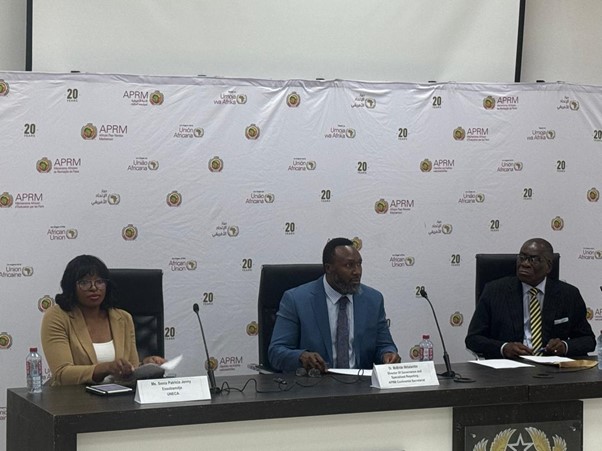African Peer Review Mechanism (APRM) Continental Secretariat has advised the government to overhaul its approach to credit rating management, addressing critical gaps in institutional coordination despite the country’s strong technical expertise.
Dr. McBride Nkhalamba, Director of Governance and Specialised Reporting at the African Peer Review Mechanism (APRM) Continental Secretariat, highlighted these findings from a recent technical support mission to Ghana.
“While Ghana possesses commendable technical expertise within the Ministry of Finance and other institutions, there are gaps in institutional and inter-agency coordination,” Dr. Nkhalamba stated during a media briefing. He emphasized the need for proactive engagement with credit rating agencies outside routine review periods.
The mission, conducted in March 2024, revealed that Ghana’s interactions with credit rating agencies have been largely reactive, often limited to scheduled review periods. This approach, according to Dr. Nkhalamba, fails to capitalize on opportunities for ongoing dialogue and timely communication of positive economic developments.
To address these shortcomings, the APRM has recommended that Ghana establish a structured national framework for managing engagements with international credit rating agencies. A key component of this framework is the creation of a dedicated credit rating liaison team within the Ministry of Finance, incorporating representatives from the Bank of Ghana.
“We’re proposing the institutionalization of a dedicated credit rating liaison team,” Dr. Nkhalamba explained. “This would ensure consistent and transparent communication with rating agencies, proactively addressing risk exposures and showcasing Ghana’s economic progress.”
The APRM also advised establishing a standing committee on sovereign credit ratings to improve coordination and response strategies. This committee would bring together key stakeholders from various government departments and financial institutions to develop a unified approach to credit rating management.
Ms. Sonia Patricia Jenny Essobmadje from the United Nations Economic Commission for Africa (UNECA) underscored the importance of these measures. “For African governments and businesses, credit ratings are pivotal in determining borrowing costs,” she stated. “A higher credit rating translates to lower interest rates, reducing the cost of debt servicing and freeing up resources for critical investments.”
Ghana’s efforts to improve its credit rating management come amid a broader continental push to establish an African Credit Rating Agency (ACRA). This initiative aims to provide a more nuanced and contextually relevant assessment of African economies, challenging the perceived biases of Western-based rating agencies.
Dr. Nkhalamba addressed concerns about the credibility of an African-led rating agency, stating, “Credibility primarily derives from methodology. This institution is being established with universally credible methodologies.” He emphasized that ACRA will use verifiable data generated by African economies and credible institutions.
The development of ACRA is supported by high-profile advocates, including Akinwumi Adesina, president of the African Development Bank. Adesina recently argued that Africa’s risk profile is not inherently higher than other regions of the world, citing significant investor interest in the continent.
A United Nations Development Programme report suggests that African nations could potentially save up to US$74.5 billion if credit ratings were based on more objective criteria, highlighting the financial implications of current rating practices for African economies.
In 2022, Ghana’s creditworthiness status came under back-to-back downgrades as its debt continually grew beyond sustainable levels. On December 8, 2022, Fitch Ratings downgraded Ghana’s Long-Term Local-Currency (LTLC) Issuer Default Rating (IDR) to ‘C’ from ‘CC’. The issue ratings on local-currency bonds issued domestically were also downgraded to ‘C’ from ‘CC’. Fitch has affirmed Ghana’s Long-Term Foreign-Currency IDR at ‘CC’.
Moody’s slashed the country’s credit rating from B3 to Ca, the second-lowest score at Moody’s putting Ghana on par with Sri Lanka, which is in default. This was after Ghana announced a debt exchange programme after the government’s admission that Ghana was a high-debt distressed country.
Standard and Poor’s (S&P) Global Ratings pushed Ghana’s debt further into speculative territory, lowering its foreign and local currency sovereign ratings to CCC+/C from B-/B. The rating by S&P was expected as the suspension of the debt payments signified a default by the country.










